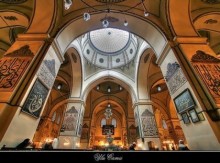


Bursa (ancient Prusa), city in northwestern Turkey, near Mudanya, a port on the Sea of Marmara, with which it is connected by rail.
Formerly Brusa or Brussa, it is the capital of Bursa Province. Bursa is divided into three parts by a series of ravines, which are spanned by a number of bridges. A ruined castle on a rocky eminence in the central section marks the site of ancient Prusa. The city is noted for its mosques, some of which show the influence of Byzantine, Persian, and Arab architecture; for its hot sulfur springs and baths; and for its tombs, containing the remains of several early Ottoman sultans. Silk spinning and the manufacture of towels and rugs are among the principal industries of the city. Founded in the 3rd century BC by Prusias I, king of Bithynia, and made the royal capital, Bursa later was included in the Roman and Byzantine empires. Orhan, son of the second sultan of Turkey, captured the city in 1326 during the Turkish conquest of the Byzantine Empire and made it the capital of the Ottoman Empire; in 1361 Orhan's son, Murad I, moved the royal residence to Adrianople (modern Edirne). Sacked by the Tatars in 1402, Bursa was burned by mutinous Janissaries in 1607. Between 1921 and 1922, during the Greco-Turkish War, considerable fighting took place in and around Bursa.